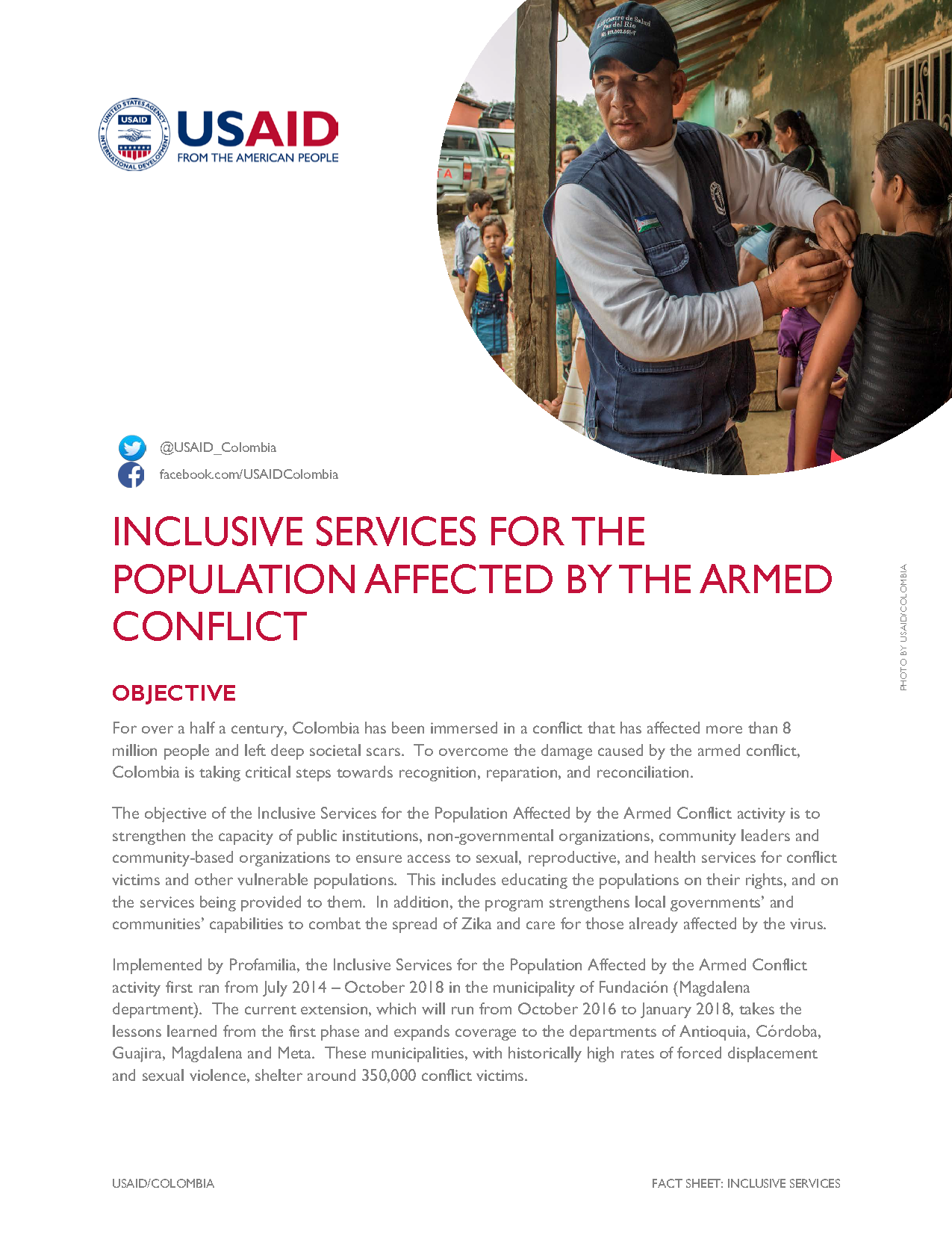Speeches Shim
OBJECTIVE
For over a half a century, Colombia has been immersed in a conflict that has affected more than 8 million people and left deep societal scars. To overcome the damage caused by the armed conflict, Colombia is taking critical steps towards recognition, reparation, and reconciliation.
The objective of the Inclusive Services for the Population Affected by the Armed Conflict activity is to strengthen the capacity of public institutions, non-governmental organizations, community leaders and community-based organizations to ensure access to sexual, reproductive, and health services for conflict victims and other vulnerable populations. This includes educating the populations on their rights, and on the services being provided to them. In addition, the program strengthens local governments’ and communities’ capabilities to combat the spread of Zika and care for those already affected by the virus.
Implemented by Profamilia, the Inclusive Services for the Population Affected by the Armed Conflict activity first ran from July 2014 – October 2018 in the municipality of Fundación (Magdalena department). The current extension, which will run from October 2016 to January 2018, takes the lessons learned from the first phase and expands coverage to the departments of Antioquia, Córdoba, Guajira, Magdalena and Meta. These municipalities, with historically high rates of forced displacement and sexual violence, shelter around 350,000 conflict victims.
COMPONENTS
Strengthening Local Governments
The activity strengthens the capacity of local governments to make informed decisions to guarantee sexual, reproductive, and health rights for conflict victims and vulnerable populations. It also prioritizes sustainability and the local institutional capacity to manage and deliver services. The activity will create comprehensive health care plans that incorporate the needs of those affected by the conflict and by the presence of Zika. The activity prioritizes the inclusion of gender-based violence, teen pregnancy and sexual violence in policy formulation.
Justice Sector Assistance
The activity empowers the community to defend their rights and provides strategies for citizen participation in individual and collective reparation actions. The activity assists in the generation and strengthening of the paths that gender-based and sexual violence conflict victims can use to access help. In addition, the activity empowers the community, in particular the youth, to become leaders that promote and guarantee the rights of these populations.
Health Sector Assistance
The activity supports the transfer of methodologies and best practices in health care, utilizing a differential, gender and rights-based approach. Community therapy promotes mental health to contribute to the collective reparation of conflict victims. In addition, the activity establishes three priorities—prevention of teen pregnancy, gender-based violence, and sexual violence—as key issues for municipal plans, programs and projects.
Education Sector Assistance
Technical assistance is provided to the local schools and Education Secretaries in project design and development according to the Ministry of Education guidelines on sexual education and citizenship development.
RESULTS
- Developed and formalized five paths to attending patient health needs.
- Trained 39 organizations on their rights and the resources available through local institutions.
- Supported the construction of four institutions to provide education on sexual reproduction and citizenry.
- Conducted the first municipal survey in Fundación to understand the sexual and reproductive health of male and female conflict victims between the ages of 13 and 69.
- Assisted the local government of Fundación in the design of their municipal development plan 2016 – 2019, to include observing national sexual and reproductive regulations.


Comment
Make a general inquiry or suggest an improvement.